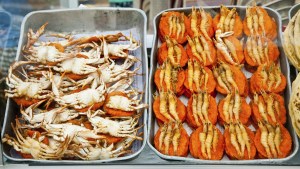Allesandra Galloni & David Lawler, whose chosen title runs thus: “Nothing off the table in US response to China overcapacity, Yellen says”… 26 April 2024
1/3]U.S. Treasury Secretary Janet Yellen attends an interview with Reuters Editor in Chief Alessandra Galloni in Washington, U.S., April 25, 2024. REUTERS/Evelyn Hockstein Purchase Licensing Rights, opens new tab
The Biden administration is not taking any options off the table to respond to China’s excess industrial capacity, which is a top concern for the U.S. and its allies, U.S. Treasury Secretary Janet Yellen told Reuters on Thursday.
China exporting its way to full employment is not acceptable to the rest of the world, Yellen said in a Reuters Next interview in Washington.
Yellen said that during her
trip to China earlier this month, she was “successful” in raising U.S. concerns with Chinese officials about Beijing flooding global markets with electric vehicles (EVs), solar panels and other clean energy goods, threatening U.S. jobs. She added that Chinese officials acknowledge a problem with industrial overcapacity, but they needs to address it.
Continue reading →Like this:
Like Loading...













